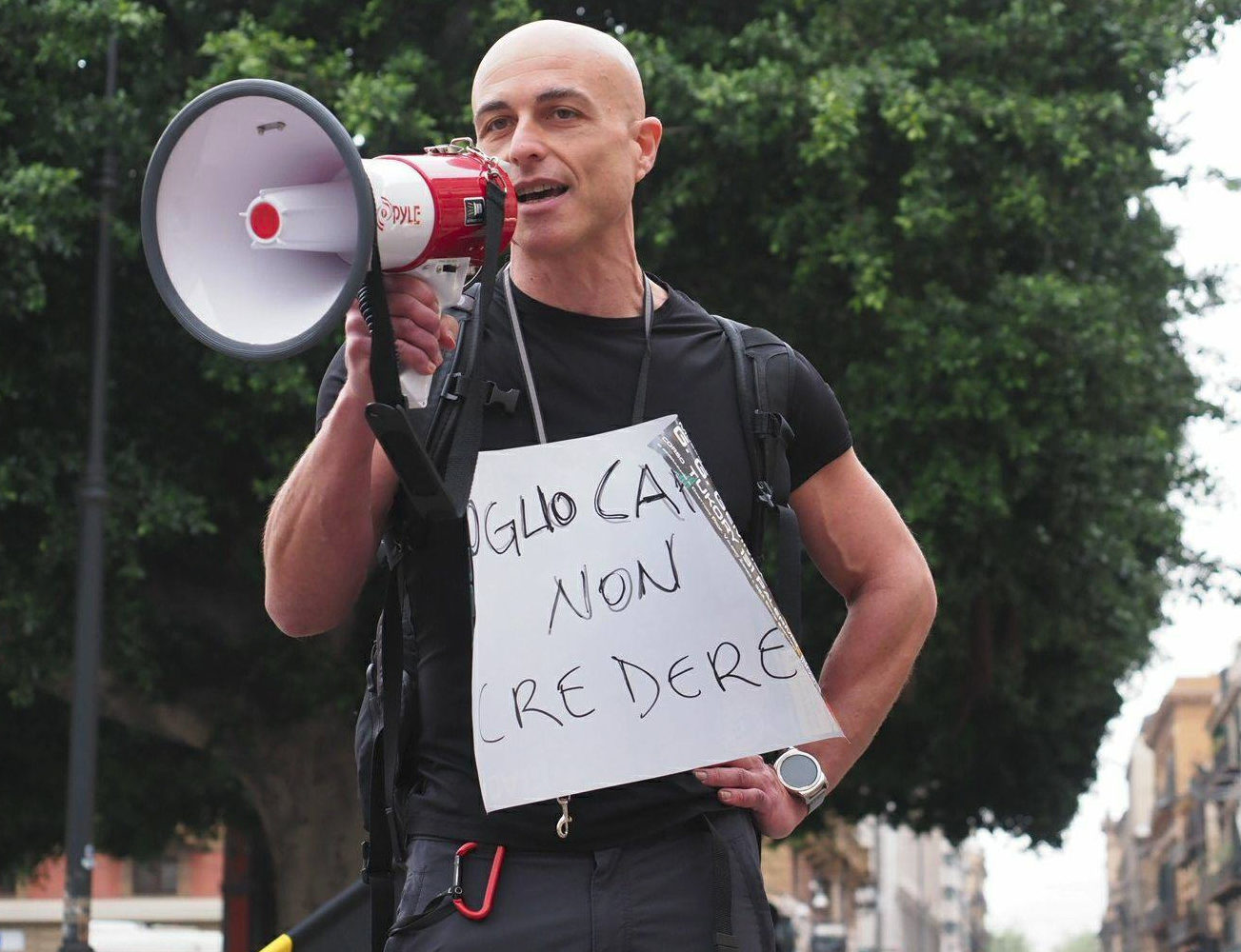
Giorgio Maone from Italy: “We closed our venues before the lockdown, churches are still open today”
#GlobalHumanismNow: an update from the Italian Union of Rationalist Atheists and Agnostics (UAAR).

#GlobalHumanismNow: an update from the Italian Union of Rationalist Atheists and Agnostics (UAAR).
#GlobalHumanismNow is a series of mini-interviews with our Members and Associates from all around the world where we ask them how they are coping with the global coronavirus emergency, to explain what initiatives they are taking, and to tell us how the global humanist community can support them.
All interviews are available here.
Today we speak with Giorgio Maone, Executive Board Member of the Italian Union of Rationalist Atheists and Agnostics (UAAR).
Humanists International: Hi Giorgio, thank you for accepting our invitation. How is the situation in our country, Italy?
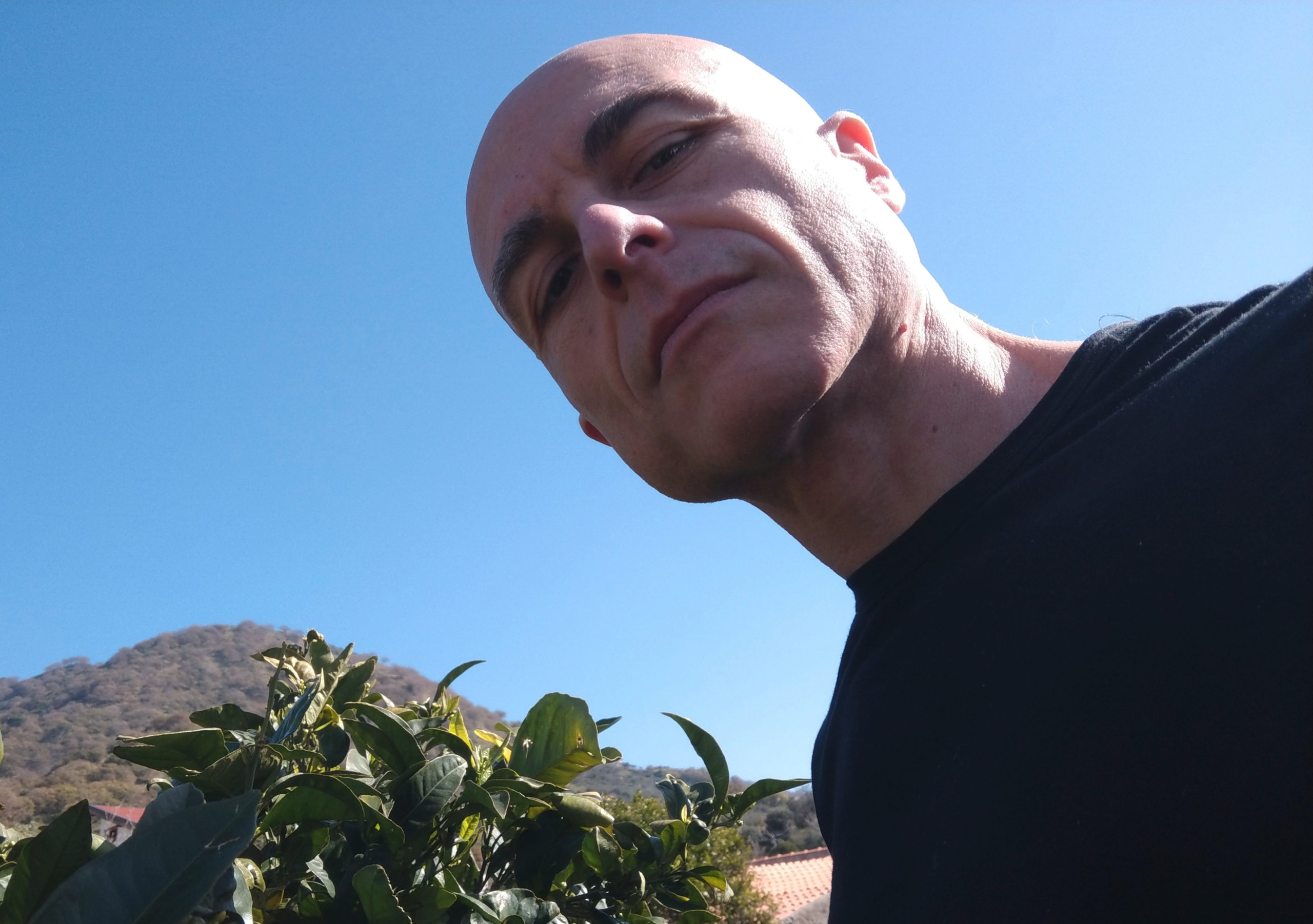 Giorgio: Italy is notoriously one of the most severely affected countries, with about 25,000 confirmed deaths so far (22 April), but it seems we’re finally flattening the contagion curve. However, any realistic assessment or forecast is hard to make because, so far, the testing has been very sparse and administered only to people showing symptoms.
Giorgio: Italy is notoriously one of the most severely affected countries, with about 25,000 confirmed deaths so far (22 April), but it seems we’re finally flattening the contagion curve. However, any realistic assessment or forecast is hard to make because, so far, the testing has been very sparse and administered only to people showing symptoms.
[UPDATE: as of 24 April, Italy registers 187,327 cases and 28,085 deaths]
How has the government responded to the crisis?
Italy has been under full lockdown for more than a month and a half now. Even though the daily death toll is still very high and the contagion trend is hard to gauge due to the aforementioned testing issues, the government has announced a so-called “phase 2”. Starting next week, workplaces will gradually reopen, mainly pushed forward by the protests of the General Confederation of Italian Industry and by the grim economic perspectives.
Do you think Italy is ready for this “phase 2”?
Unfortunately, there’s reason to fear we’re not prepared yet in regards to large scale testing, the privacy-preserving contact tracing technology, and the ubiquitous availability of effective protection devices which such a step requires. Unsurprisingly, labor unions, epidemiologists, independent public health experts and human rights advocates are quite worried about phase two, and news of second waves happening in the Far East are hard to ignore.
How has the crisis affected UAAR and the individuals within it?
In its more than 30 years of activity, local chapters have been the focal point of UAAR’s action: our street-facing offices, in about 40 of the most important Italian cities, are the places where we welcome members and sympathizers, hold regular gatherings, discuss and provide advice about secular civil rights and the humanist lifestyle. Needless to say, this face-to-face activism has been disrupted by the social distancing requirements, which we obeyed responsibly by closing our venues even before explicit orders were issued by the government.
In comparison, churches are still open today. Therefore, we’ve suddenly lost our main feedback loop with our members and civil society, in a time when superstition is resurfacing among the population and fake news are running rampant on social media.
The Catholic Church seems to be exploiting this situation of panic and disorientation, right?
Yes, indeed. The Vatican is occupying every bit of the remaining public space. The pope is on air almost 24/7 doing public broadcasting. Journalists and politicians (even the most progressive ones!) are praising the Pope as the greatest world leader in these dire times.
This helps the Catholic Church to monopolize on both private donations and public funds for the recovery efforts. The Church does it through its directly controlled “charities” such as Caritas and “Banco Alimentare” (Food Bank), in a perverse reinforcing loop of proselytism. In this way the Church eclipses its secular counterparts in the public narrative, such as Emergency, Doctors without Borders and other secular NGOs.
And there are even some Catholic groups trying to ban abortion during the pandemic…
Yes, some anti-choice lobbyists are pushing for an abortion moratorium with the excuse of public hospitals (the only place where the procedure is legal) being overwhelmed by COVID-19. We also see some religious groups gathering either publicly or in secret to celebrate masses. All this is very depressing for our members, which feel marginalized and discriminated in times when the voice of reason should guide the public policy. As rationalists, we are afraid of the long term consequence of this dangerous cultural drift.
How is UAAR responding to the crisis?
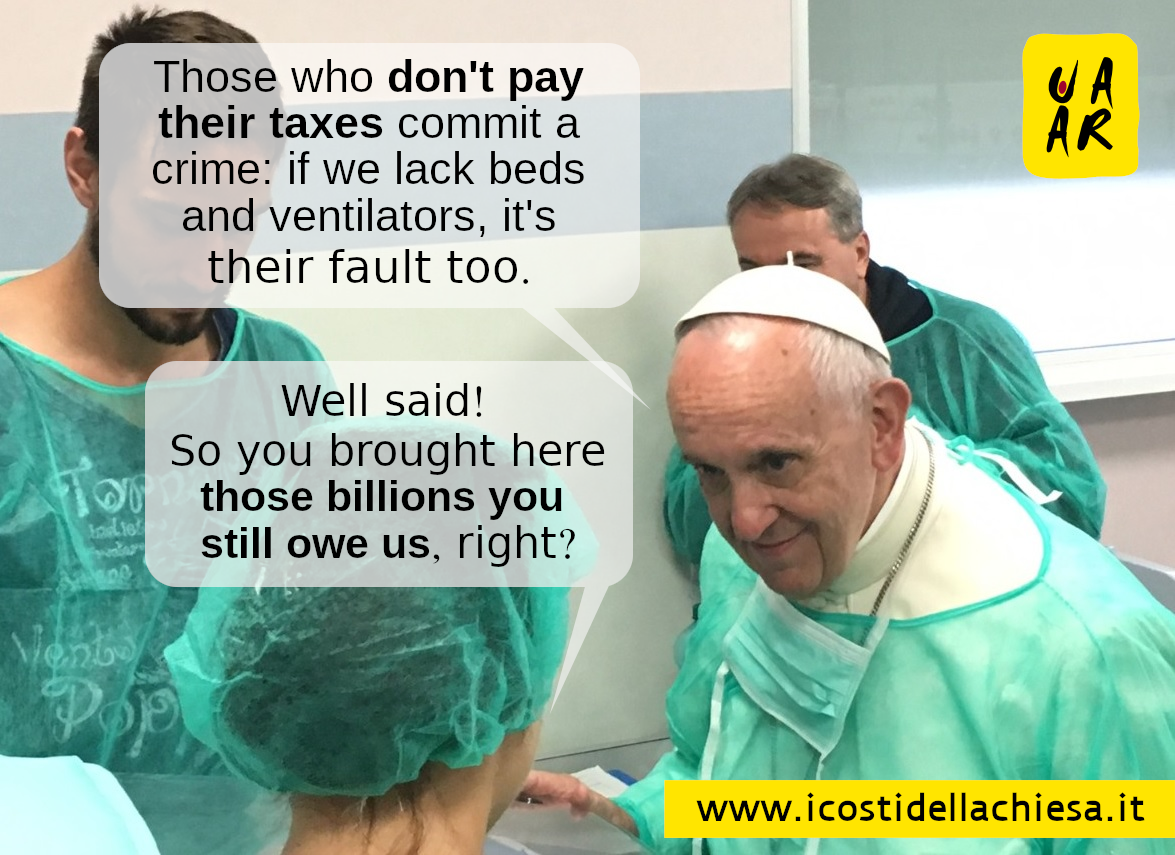
One of UAAR’s recent memes, criticizing Pope Francis’ remark that Italian hospitals lack beds and ventilators due to some Italian citizens not paying taxes, while the Catholic Church still owes to the Italian State 4 billions euros of unpaid taxes
First of all, we’ve strengthened our already well-established digital channels (our Facebook page, for instance, has more than 150,000 followers). We are now campaigning more aggressively on social media, with messages outlining the hypocrisy of the church.
But this hypocrisy is nothing new, right?
No, it’s not. For people abroad it might sounds crazy, but in Italy taxpayers have to devolve a compulsory 0.8% tax to one of the few religious groups recognized by the State. We’re now petitioning the government to divert the tax money paid by non-religious taxpayers (which is about 80% of the total) to emergency response measures instead. Exploiting this mechanism, the Catholic Church receives every year 1,2 billion euros from taxes paid by Italian citizens (6,7 billions if we sum up all other sources of direct and indirect State funding). And yet the Church is using only a tiny part of this money to face the emergency, “donating” it to its own charities and its own hospitals.
Also UAAR made a donation…
Yes, we donated €10.000 to the National Institute for Infectious Diseases « Lazzaro Spallanzani », which is researching a vaccine. We also launched a crowdfunding campaign: thanks to the generosity of our members we fundraised €7,000. Sure our donation was smaller than the one from the Catholic Church, but all of it came from our own pockets.
What are UAAR’s other initiatives?
Another pandemic-related battle we’re fighting is for the protection of reproductive rights. For instance, we are promoting pharmacological abortion, which is ostracized, albeit legal, in this country.
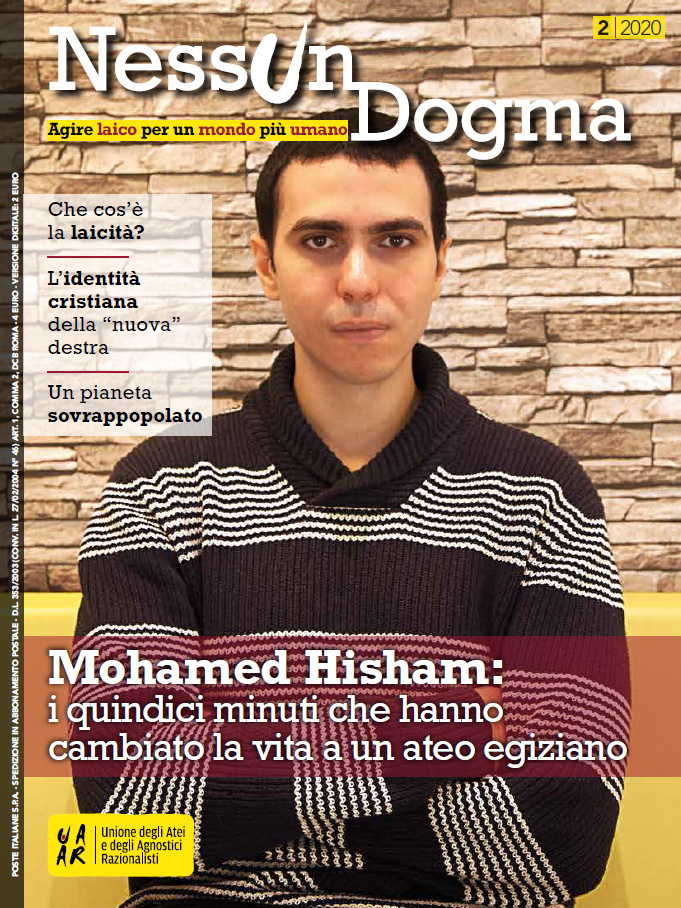
Cover of the second issue of UAAR’s revue dedicated to Mohamed Hisham and “the 15 minutes that changed the life of an Egyptian atheist”
We keep publishing our new revue, Nessun Dogma. The second issue contains also an interview with Mohamed Hisham, the Egyptian atheist who had to escape from his country because of his atheism.
Many of our local chapters now have their regular gatherings online, using videoconferencing platforms, and some keep participating also in bigger virtual events, like the editorial fair where we’re going to present UAAR’s Italian version of Masih Alinejad’s book, “The Wind in My Hair“. We will broadcast a video-interview with Alinejad, one of the bravest secular feminist activist in the world. The interview will focus on the mismanagement of the pandemic by the Iranian religious dictatorship.
Lastly, the chairs of our local chapters are doing their best to stay in contact with our members, picking up the phone, sending email updates, looking out for people with special needs and coordinating help for the most vulnerable among us. We strongly believe social distancing should not make us lose our human(ist) touch.
Has the pandemic affected society in other ways?
Social distancing is necessary, but I’m very worried about how it can exacerbate the tribalism already rampant across our societies, pinning people against each other by creating artificial high moral grounds. I’ve seen people yelling from their balcony against a solitary runner or against a father taking his children out for a brief walk around the condo (even though the rules allow it) or against homeless and migrant people, which is even worse since they simply have no place to isolate themselves.
On the macro level, we’re all witnessing the cross-accusations among nations and the jingoistic rhetoric polluting the “war on Coronavirus” public discourse, Trump’s insane decision of defunding the WHO, and even the competitive race to find (and patent) cures and vaccines. It almost seems that the very “politics of divisions”, stigmatized in our Auckland Declaration, has found a formidable weapon in this pandemic.
I’m terrorized by the permanent damage this pandemic may cause to our ability to effectively manage politics of division and other global threats. This includes the unjustifiable social inequalities that deepen even more during the current situation. Also worrying is the climate crisis which we’ve put on the back burner but certainly will come back and bite us, worse than before, as soon as we start “relaunching our economies”.
How do you think we should face this emergency as humanists? Which humanist principles should we value most right now?
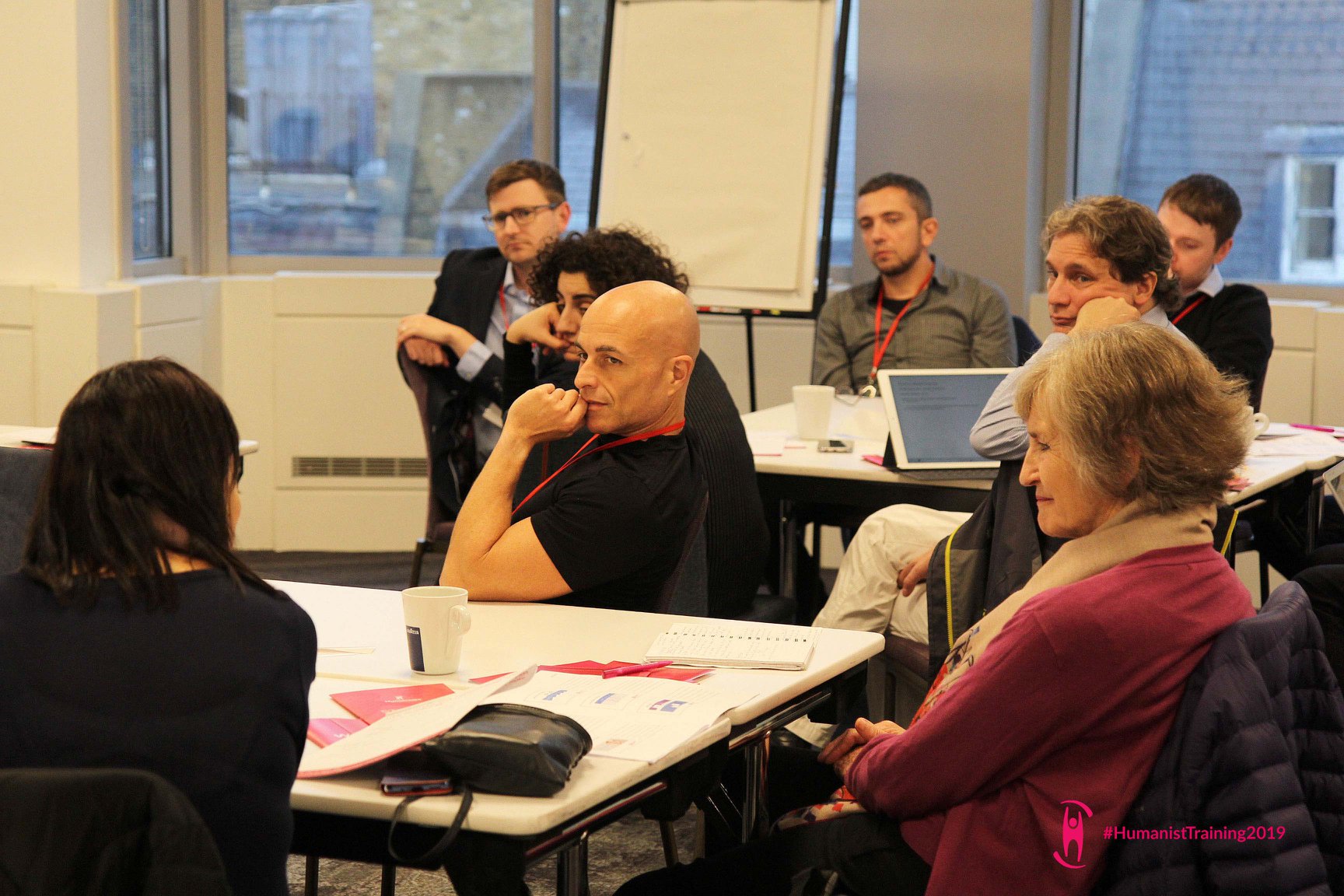
Giorgio during the 2019 European Humanist Training in London
I’ve already mentioned Humanists International’s Auckland Declaration against the politics of division. Now more than ever we should value our unique ability, as a species, to join forces in a common effort, and bring it up to a global scale. The humankind should stand as a whole against the common enemy, win this battle and learn from this so that we are prepared for future challenges.
The most important values right now are resource pooling, redistribution of excess wealth, evidence-based policy-making, cooperative scientific research, and the rejection of superstition, misinformation, discrimination and prejudice through education and critical thinking. However, the values shouldn’t be viewed as throw-away emergency patches. They must become our blueprints to transform this world into a safer, fair, humane place to live. Because we’ve got no “other world”.
How can the international community support your efforts?
In these times of forced isolation, we truly need ways to not feel alone and to be reminded of our place as members of a global movement. I’m grateful for the wonderful job Humanists International is doing at this, by launching its new Facebook group and amplifying inspiring voices of humanists all around the world. Let’s pursue even more ways to connect and get ourselves together. Keep up the good work!
And what is your message to the global humanist community?
Very short and simple: unite!
Thanks, Giorgio! And please stay safe!
Thank you, Giovanni. From one Italian to another, I’m looking forward to the time we can again dare to hug and kiss a stranger we’ve just met, like we were used to. Or not 😉 Stay safe!
If you represent a Member or Associate of Humanists International and you want to participate in the #GlobalHumanismNow series, please contact us at [email protected]